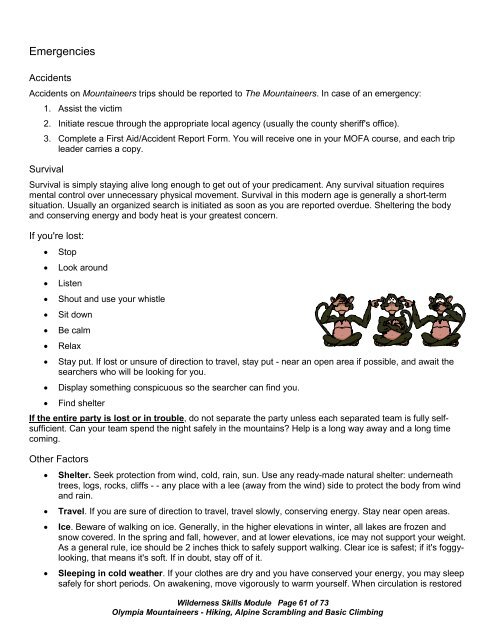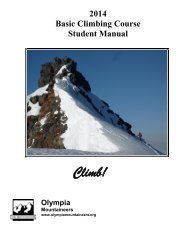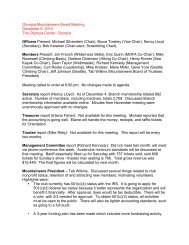Wilderness Skills - Olympia Mountaineers
Wilderness Skills - Olympia Mountaineers
Wilderness Skills - Olympia Mountaineers
Create successful ePaper yourself
Turn your PDF publications into a flip-book with our unique Google optimized e-Paper software.
Emergencies<br />
Accidents<br />
Accidents on <strong>Mountaineers</strong> trips should be reported to The <strong>Mountaineers</strong>. In case of an emergency:<br />
1. Assist the victim<br />
2. Initiate rescue through the appropriate local agency (usually the county sheriff's office).<br />
3. Complete a First Aid/Accident Report Form. You will receive one in your MOFA course, and each trip<br />
leader carries a copy.<br />
Survival<br />
Survival is simply staying alive long enough to get out of your predicament. Any survival situation requires<br />
mental control over unnecessary physical movement. Survival in this modern age is generally a short-term<br />
situation. Usually an organized search is initiated as soon as you are reported overdue. Sheltering the body<br />
and conserving energy and body heat is your greatest concern.<br />
If you're lost:<br />
• Stop<br />
• Look around<br />
• Listen<br />
• Shout and use your whistle<br />
• Sit down<br />
• Be calm<br />
• Relax<br />
• Stay put. If lost or unsure of direction to travel, stay put - near an open area if possible, and await the<br />
searchers who will be looking for you.<br />
• Display something conspicuous so the searcher can find you.<br />
• Find shelter<br />
If the entire party is lost or in trouble, do not separate the party unless each separated team is fully selfsufficient.<br />
Can your team spend the night safely in the mountains? Help is a long way away and a long time<br />
coming.<br />
Other Factors<br />
• Shelter. Seek protection from wind, cold, rain, sun. Use any ready-made natural shelter: underneath<br />
trees, logs, rocks, cliffs - - any place with a lee (away from the wind) side to protect the body from wind<br />
and rain.<br />
• Travel. If you are sure of direction to travel, travel slowly, conserving energy. Stay near open areas.<br />
• Ice. Beware of walking on ice. Generally, in the higher elevations in winter, all lakes are frozen and<br />
snow covered. In the spring and fall, however, and at lower elevations, ice may not support your weight.<br />
As a general rule, ice should be 2 inches thick to safely support walking. Clear ice is safest; if it's foggylooking,<br />
that means it's soft. If in doubt, stay off of it.<br />
• Sleeping in cold weather. If your clothes are dry and you have conserved your energy, you may sleep<br />
safely for short periods. On awakening, move vigorously to warm yourself. When circulation is restored<br />
<strong>Wilderness</strong> <strong>Skills</strong> Module Page 61 of 73<br />
<strong>Olympia</strong> <strong>Mountaineers</strong> - Hiking, Alpine Scrambling and Basic Climbing




